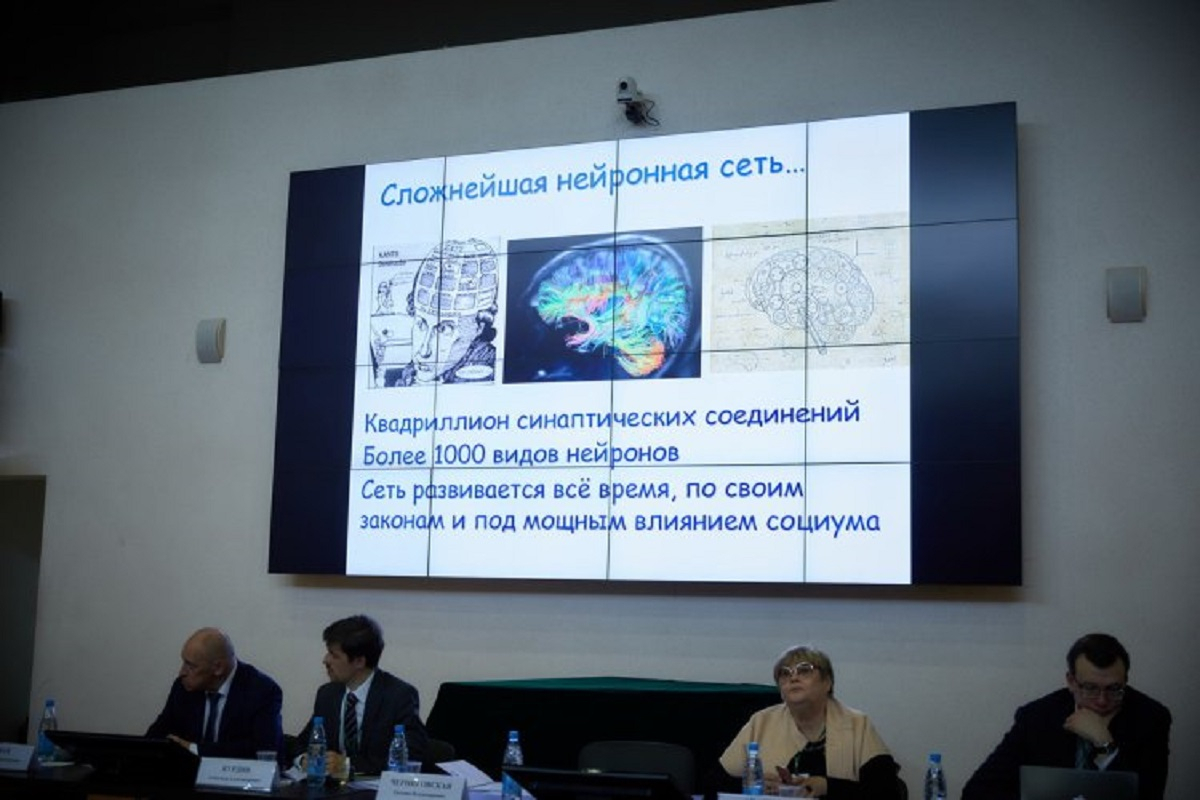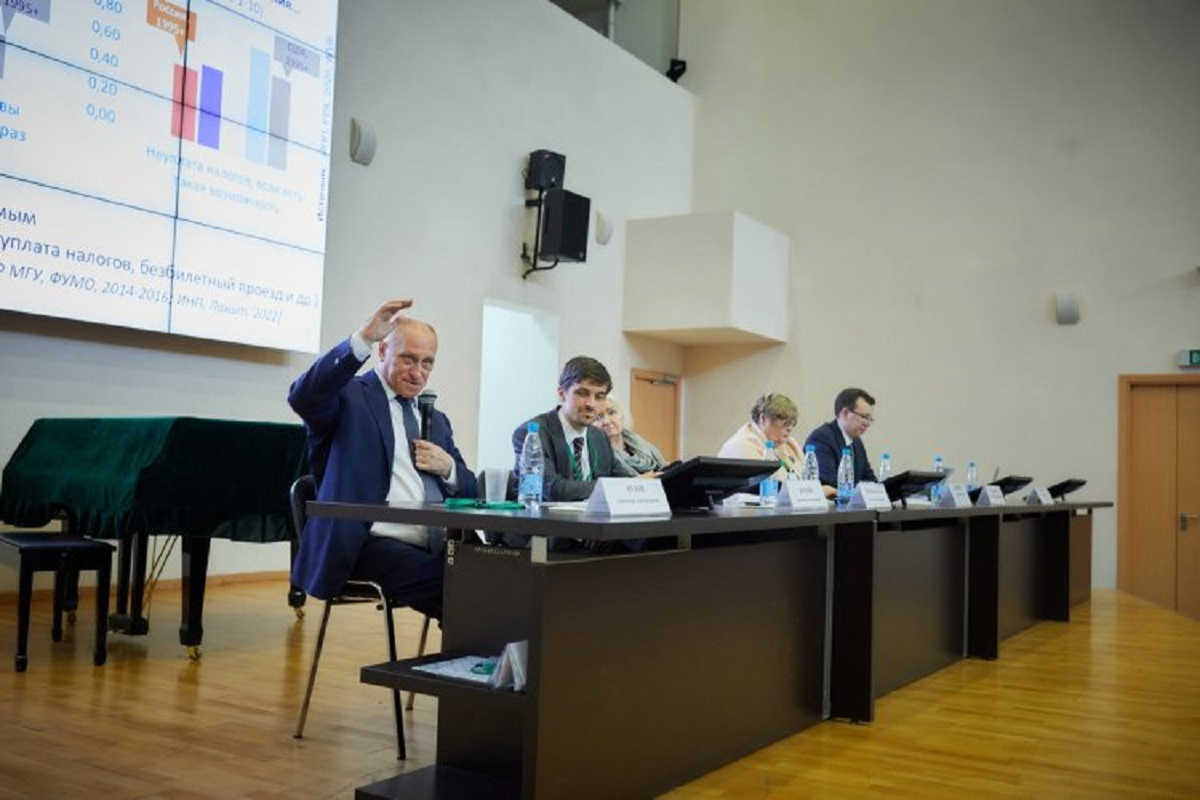Scientific Russia: AI, culture of failure and the brain that creates worlds. Lomonosov Readings at Lomonosov Moscow State University
The annual Lomonosov Readings have started at Lomonosov Moscow State University. The team of the ‘Scientific Russia’ took part in the opening of the conference at the Faculty of Economics at Lomonosov Moscow State University. Researchers and educators discussed the topic "Human and social capital of Russia: new challenges and opportunities".
Experts focused on the shortage of personnel in the labour market in Russia; problems of education; artificial intelligence (AI); social networks; and generation Z. Among the key moments of the meeting was the discussion of the principles of how our brain works and the confrontation between two types of intelligence: natural and artificial. This was the focus of the report by Tatiana Chernigovskaya, Director of the Institute for Cognitive Studies at St Petersburg University, Member of the Russian Academy of Education. The development of AI can lead to the degradation of natural intelligence, said the outstanding biologist and philologist. The semantic gap between intuition and logic has been overcome and, apparently, intuition is no longer an exclusive prerogative of humans, but what artificial intelligence has already acquired today, she said.
This looks like a cognitive attack or even a civilisational challenge to our ideas about human intellectual capabilities.
Tatiana Chernigovskaya, Director of the Institute for Cognitive Studies at St Petersburg University, Member of the Russian Academy of Education
Artificial intelligence has created works of art that are not inferior to human creations, she said. As an example, she showed a photograph that won the main prize at the prestigious Sony World Photography Awards in 2023. The sensational image called Pseudomnesia: The Electrician was generated by the neural network DALL E2.
What about the human brain? What kind of worlds can our brain create? Tatiana Chernigovskaya said that we mistakenly believe that the brain is constantly busy only receiving information about the outside world coming from the senses and responding to this information.
"Perhaps, this is far from being the main thing what our brain focuses on. Our brain has its own goals. It is not reactive, but active. The human brain creates the worlds in which we live. We ourselves create worlds that have absolute value for us. The important thing is not that the brain reacts, but that it itself creates worlds, and it seems that only we on this planet know how to do this. Our only competitor is artificial intelligence," said Tatiana Chernigovskaya.

The Lomonosov Readings also focused on education. Natalia Zhukova, Director of the Sber Education Industry Centre, Candidate of Psychology, shared her views on this issue. According to the psychologist, one of the main trends in the Sber’s educational environment is human-centricity, i.e. promoting the disclosure of a person’s potential and expanding the space of our possibilities to achieve our aspirations. In this regard, Sber acts as an assistant on the human side.
The predictability and understandability of the world is decreasing and Russia is the leader in the rejection of uncertainty, by a large margin from other countries, said the psychologist.
Кроме того, жители Санкт‑Петербурга и Ленинградской области получат к счетам за коммунальные услуги от Единого информационно‑расчетного центра праздничный вкладыш, выполненный в фирменном стиле СПбГУ.
The level of uncertainty aversion in Russia, according to Geert Hofstede, is 95. In Germany, this mark reaches 65, in the USA it is 46, while in India and China it is even less: 40 and 30, respectively.
The reasons behind avoiding the uncertainty were discussed by Alexander Auzan, Dean of the Faculty of Economics at Lomonosov Moscow State University. They are associated with the history of our country and one of the main cultural features of Russia, he said.
"This is very unproductive from the point of view of the innovation economy, the venture economy. This is, in general, a fear of the future. Where does it come from? There are three more countries with high uncertainty avoidance. They are France, Guatemala, Uruguay. How are France and Russia similar? In terms of the number of revolutions. How are Uruguay and Guatemala similar? In terms of the number of military coups. The countries that have experienced numerous dramatic changes prefer the status quo, which is dangerous for development. In fact, education can solve this issue. Do you know how? A culture of failure. We just need to teach people that you may not succeed at first. We need to understand that a person has the right to make mistakes, and then we will gradually get out of this situation."

The conference also featured a report on the tools of economic development in the context of competition for human capital by Maria Bagreeva, Minister of the Moscow Government. It also had a report on the benefits of monitoring social media for improving population development policy by Irina Kalabikhina, Associate Professor at Lomonosov Moscow State University. There was also a report on overcoming the labour shortage in the labour market by Tatiana Maleva, Director of the Institute for Social Analysis and Forecasting of the Russian Presidential Academy of National Economy and Public Administration. The readings also brought together Irina Abankina, Professor in the Institute of Education at the National Research University Higher School of Economics; Elena Nikishina, Associate Professor at Lomonosov Moscow State University; and Alexander Maltsev, Acting Head of the Department of Political Economy at the Faculty of Economics at Lomonosov Moscow State University.
The Lomonosov Readings took place at Lomonosov Moscow State University from 17 to 19 April 2024.

